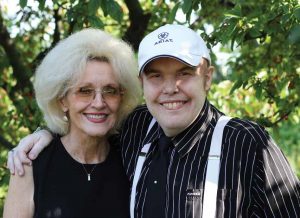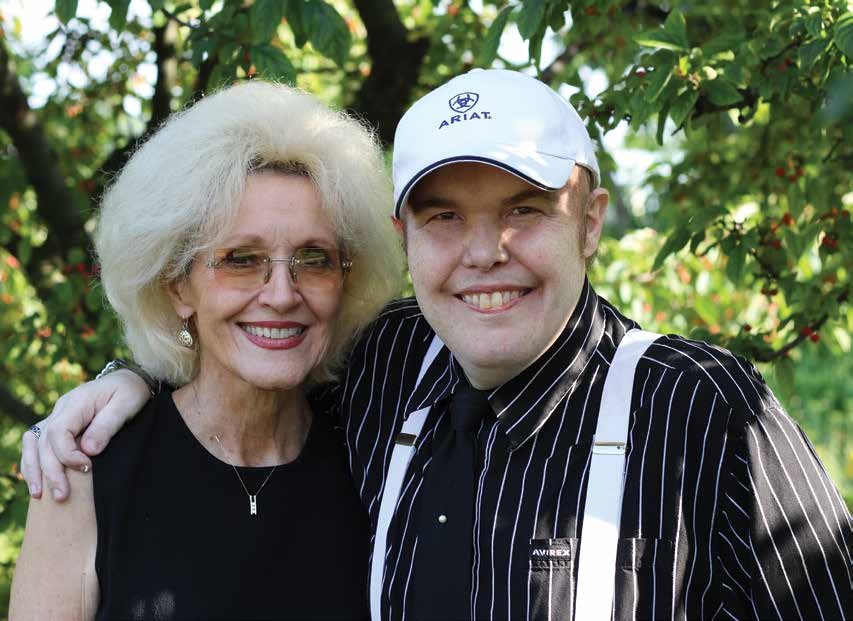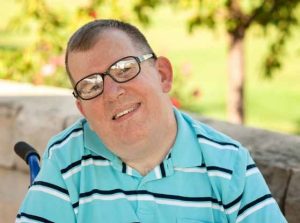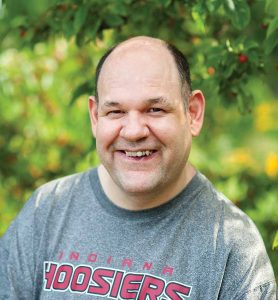When children are little, you don’t notice that milestones aren’t being met. It is only when they are older that you notice the differences. I can still clearly see the chart the doctor drew for us. It showed the typical child gaining upward progression in all areas, but David’s line only progressed horizontally.
Does it really matter why he’s this way? This is just the way he is. I couldn’t believe what I was hearing. A mother wants to know.
David Anthony Knight’s life began in Youngstown, Ohio, in 1971. It was a difficult pregnancy and birth. My husband and I had been married three years, but divorced after David was born. David seemed sickly from the beginning; he didn’t walk until he was 18-months-old. Did something happen during the pregnancy?
When David was two, he was hospitalized for a long while with a high fever. After that, he was no longer saying his ABC’s and stopped spelling “cat” and “dog.” He also started falling. Was it the fever?
 My journey to find out what was wrong with my son took us to the Cleveland Clinic. The pediatric neurologist performed many tests and finally told us David would never be independent. Of course, we weren’t seasoned for that prediction. The doctor told us David had a mixed bag of issues: speech, motor skills, and learning disabilities. He drew us that chart.
My journey to find out what was wrong with my son took us to the Cleveland Clinic. The pediatric neurologist performed many tests and finally told us David would never be independent. Of course, we weren’t seasoned for that prediction. The doctor told us David had a mixed bag of issues: speech, motor skills, and learning disabilities. He drew us that chart.
In addition to his low functioning speech, his poor motor skills, and his learning disabilities that were becoming more evident each day, David was also experiencing a type of seizure. He would shake all over—we knew this would hinder his independence further. What made the beginning of this journey so difficult was we were told David needed all types of therapies: speech, physical, occupation. None of these were available in our school system.
There was a man named Leonard Kurtz who opened a facility similar to Hillcroft because he had a child with disabilities. This new facility offered therapies—all the parents were welcoming and kind. David was fortunate to attend. While the facility was not perfect, it was a definite step up from the previous school. David did well while there, but I kept searching. I even considered enrolling him in a school in Pennsylvania. I asked questions. I searched. No one could tell me exactly what David faced and where he could get the most help. As the years passed, I finally accepted that this was the way it was going to be and that I would do the best I could with the situation.
When David was 20, we moved to Muncie and discovered Hillcroft. We are so happy David has Hillcroft. Although he is no longer able to attend all day due to his health issues, he still is able to attend on a daily basis. Because he is a people-person, he thrives there. When Isanogel was open, he enjoyed attending dances.
In addition to dancing, music, and singing, David loves his baseball caps, his jewelry, especially watches, and dressing up. In fact, Christmas or birthdays just aren’t celebrated correctly unless he receives both a new hat and a new watch. I had always hoped he would be a little more independent, but he needs help with selecting clothes, with dressing, with bathroom needs, with nearly all motor skills. I have finally accepted the fact that little tasks like tying his shoes will not be mastered—that I will always need to help and that’s just the way it is.
David’s favorite activity is talking. He doesn’t know a stranger. If given the chance, he would go off with anyone. Because he doesn’t recognize danger, he cannot be left alone. My daily routine revolves around David. He showers when he returns from Hillcroft; has a snack and watches some TV. He loves to run errands at Wal-Mart and to stop by McDonald’s. He loves the mall and loves to visit with his friends.
Part of our journey involves many, many, many doctor appointments. Two open-heart surgeries, spleen removal, gall bladder surgery, blood work, irritable bowel syndrome, anemia, oncologists, and a fractured patella— the list goes on. Last year alone, David underwent four major surgeries. This goes back to what the doctor said all those years ago—he has a mixed bag of issues. Whenever he is in the hospital, I stay around the clock with my boy. Each time he is hospitalized, it is comforting to know that Hillcroft awaits his return.
Sometimes I am sort of like an energizer bunny. I take one day at a time; I have friends I talk to; I keep in touch with my family. I used to play cards in a club, but I had to give that up. I try to do lunches with my friends, but I am often occupied with David.
I’m not depressed; I just feel that we are here together. We are doing what needs to be done.
To David, his handicap is his boo-boo knee. Other than that, he doesn’t recognize that he is handicapped. That’s a blessing. He wants to have a girlfriend, wants to work at McDonald’s, wants to have his own apartment, wants to own a car. He also wants to get married ”someday.” He reminds me that he is now 42, and I remind him that he will need to wait a little while longer.
He doesn’t quite grasp why he isn’t able to do what he wants to do.
In response to that doctor’s question all those years ago—no, it doesn’t matter why David will never be fully independent. All that matters is David is happy and I am still able to journey on this road with him.
Written by:
Cheryl Williamson has recently commenced her 33rd year of teaching French and English to high school students. Participating in the Facing Disabilities Project has helped her gain new insight into her special needs students.




